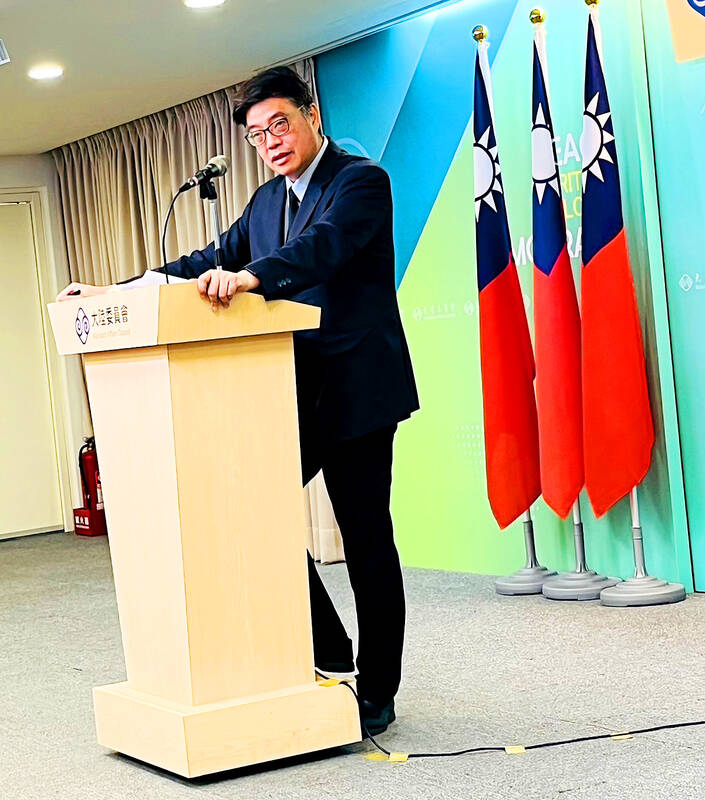The Mainland Affairs Council yesterday said that it opposed the Chinese Nationalist Party’s (KMT) proposed amendments to the Offshore Islands Development Act (離島建設條例) that would allow Chinese contractors to participate in infrastructure projects on the nation’s outlying islands.
The Democratic Progressive Party (DPP) said that the proposed amendments, if passed, would leave the nation defenseless by allowing Chinese contractors to gain express access to its territories.
The amendment was jointly proposed by KMT legislators Chen Hsueh-sheng (陳雪生) and Chen Yu-chen (陳玉珍), who represent districts in Lienchiang and Kinmen counties respectively.

Photo: Chen Yu-fu, Taipei Times
They proposed amending articles 7-1, 10, 11, 29 and 40 of the act, which would allow Chinese contractors to bid for government-funded infrastructure projects in outlying islands, recruit Chinese specialists to operate construction machinery and access Taiwan’s restricted territorial waters and set up branch offices.
Similar amendments were proposed in 2017, Minister of Mainland Affairs Council Chiu Chui-cheng (邱垂正) told a news conference in Taipei yesterday.
“We cannot agree with the proposed amendments, as they would allow Chinese contractors to take part in key infrastructure projects in airports, seaports and bridges, which could generate national security risks,” Chiu said. “It is likely that China would use these projects to infiltrate domestic politics. We will seek to explain the related issues to the two legislators.”
The council also denied that it is intentionally obstructing development on the outlying islands.
“We [MAC] have assisted contractors of the Kinmen Bridge and the Jinjiang-Kinmen Pipeline projects to bring in machinery, sea vessels and personnel when working in Taiwan’s prohibited and restricted waters,” he said. “We did not cause any construction delays.”

Several Chinese Nationalist Party (KMT) officials including Chairman Eric Chu (朱立倫) are to be summoned for questioning and then transferred to prosecutors for holding an illegal assembly in Taipei last night, the Taipei Police said today. Chu and two others hosted an illegal assembly and are to be requested to explain their actions, the Taipei City Police Department's Zhongzheng (中正) First Precinct said, referring to a protest held after Huang Lu Chin-ju (黃呂錦茹), KMT Taipei's chapter director, and several other KMT staffers were questioned for alleged signature forgery in recall petitions against Democratic Progressive Party (DPP) legislators. Taipei prosecutors had filed

Taiwan would welcome the return of Honduras as a diplomatic ally if its next president decides to make such a move, Minister of Foreign Affairs Lin Chia-lung (林佳龍) said yesterday. “Of course, we would welcome Honduras if they want to restore diplomatic ties with Taiwan after their elections,” Lin said at a meeting of the legislature’s Foreign Affairs and National Defense Committee, when asked to comment on statements made by two of the three Honduran presidential candidates during the presidential campaign in the Central American country. Taiwan is paying close attention to the region as a whole in the wake of a

President William Lai (賴清德) has appointed former vice president Chen Chien-jen (陳建仁) to attend the late Pope Francis’ funeral at the Vatican City on Saturday on his behalf, the Ministry of Foreign Affairs said today. The Holy See announced Francis’ funeral would take place on Saturday at 10am in St Peter’s Square. The ministry expressed condolences over Francis’ passing and said that Chen would represent Taiwan at the funeral and offer condolences in person. Taiwan and the Vatican have a long-standing and close diplomatic relationship, the ministry said. Both sides agreed to have Chen represent Taiwan at the funeral, given his Catholic identity and

Lawmakers from the Democratic Progressive Party (DPP) yesterday established a friendship group with their counterparts in Ukraine to promote parliamentary exchanges between the two countries. A ceremony in Taipei for the Taiwan-Ukraine Parliamentary Friendship Association, initiated by DPP Legislator Chen Kuan-ting (陳冠廷), was attended by lawmakers and officials, including Deputy Minister of Foreign Affairs Francois Wu (吳志中) and European Economic and Trade Office in Taiwan Director Lutz Gullner. The increasingly dire situation in Ukraine is a global concern, and Taiwan cannot turn its back when the latter is in need of help, as the two countries share many common values and interests,